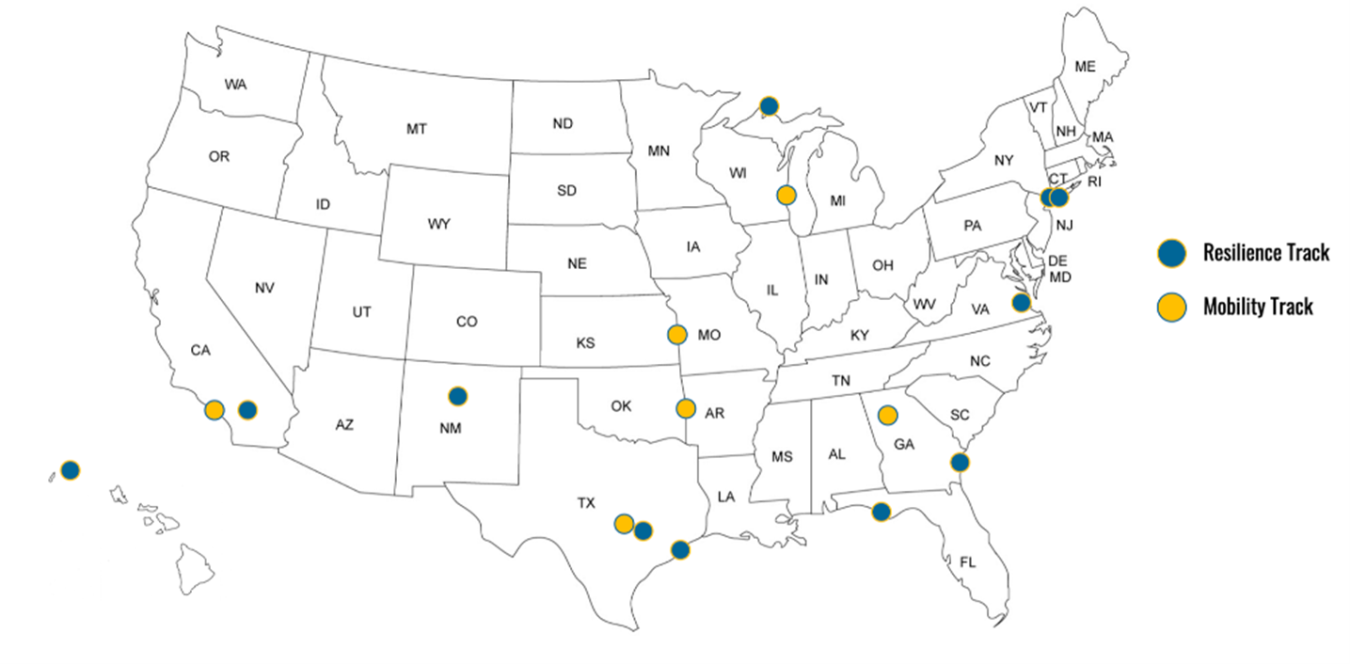The National Science Foundation (NSF) announced the winners of Stage 2 of its national research and action competition, the Civic Innovation Challenge.
Office of Energy Efficiency & Renewable Energy
September 21, 2021Today, the National Science Foundation (NSF) announced the winners of Stage 2 of its national research and action competition, the Civic Innovation Challenge. A collaboration between NSF, the Department of Energy’s Vehicle Technologies Office (VTO), and the U.S. Department of Homeland Security, the Challenge supports partnerships between communities and universities that address mobility (Track A) and resilience (Track B) priorities.
Seventeen teams comprising civic partners such as local, state and tribal officials, and non-profit and community leaders have been selected for awards of up to $1 million to conduct and evaluate ready-to-implement pilot projects with the potential to produce scalable, sustainable, and transferable solutions to address community-identified challenges in a 12-month timeframe.
"The teams selected for Stage 2 of the competition have brought forward bold and exciting ideas for the mobility and resilience tracks in this Challenge to help connect local communities to their work, school, healthcare and other public services," said Acting Assistant Secretary for Energy Efficiency and Renewable Energy Kelly Speakes-Backman. "The Department of Energy is honored to support these projects that will pilot equitable and accessible mobility solutions to mitigate the impacts of natural disasters and improve the quality of life for our communities."
Six selected projects in Track A will seek to develop community hubs for smart mobility, pilot on-demand multimodal transit, build new platforms to connect youth with employment opportunities, and more.
- Connecting Underrepresented Youths with Employment Opportunities, led by the University of Kansas Center for Research, Inc., will build and test an integrated mobile application to help underrepresented youth find and access out-of-school-time learning opportunities.
- Piloting On-Demand Multimodal Transit in Atlanta, led by the Georgia Tech Research Corporation, will synchronize on-demand shuttle services with Metropolitan Atlanta Rapid Transit Authority services and real-time feeds, and deploy these services in targeted transit deserts.
- Co-Creating a Community Hub for Smart Mobility, led by The University of Texas at Austin, will work with the nonprofit Jail to Jobs, local community members and civic partners to create a hub that provides first/last mile mobility options to reduce commute times, decrease costs and understand the social and economic impacts of these disparities.
- User-Centered Mobility Solutions: A New Vision to Connect Jobs and the Labor Force, led by the University of Wisconsin Milwaukee, will test and compare two models – labor force-centered and employer-centered – for overcoming financial and institutional barriers for regional mobility services.
- Civic Bicycle Commuting, or CiBiC, led by the University of California, Los Angeles Center for Research in Engineering, Media and Performance will launch a unique community-driven mobile app and participatory media cartography to enable and support collective bike commuting involving more than 200 participants from underserved communities in northeast downtown Los Angeles.
- A community-based framework to develop Shared MicromobIlity for affordabLe-accessIblE housing, or SMILIES, led by the University of Arkansas, will work with the community to design and deploy services in high-priority neighborhoods in Fort Smith, Arkansas. The project will estimate the impact of shared micromobility services on household travel and costs, job access, and more.
Learn more about the Civic Innovation Challenge Stage 2 awardees.

Beginning on October 5, 2021, NSF will host a two-week Ideas Fest. Researchers wishing to contribute to idea sourcing for a possible future round of the Civic Innovation Challenge can register to join a two-week Ideas Fest, which begins on October 5, 2021.
Learn more on the Civic Innovation Challenge website.

